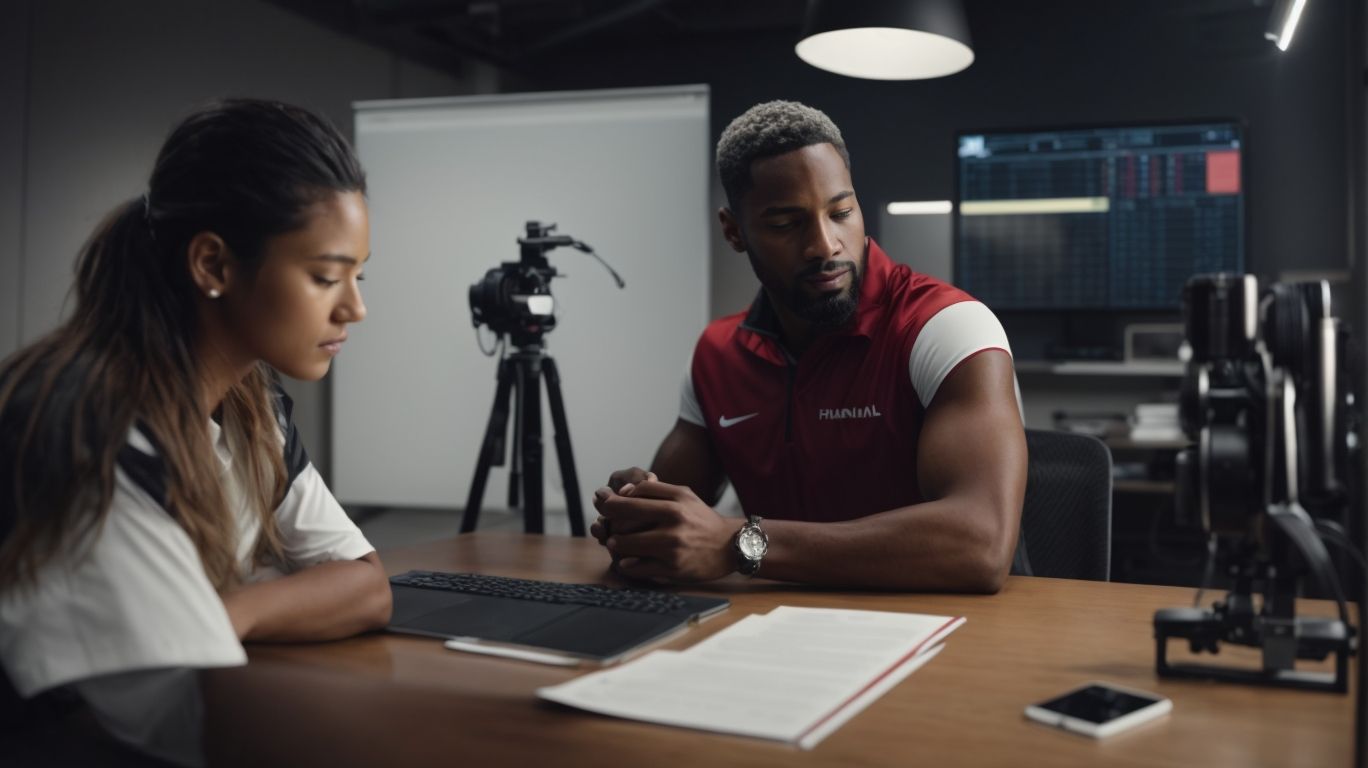Sports psychology is a fascinating field that focuses on applying psychological principles to enhance athletic performance. In this article, we will explore the main goals of sports psychology and how it can help athletes achieve their full potential.
From building mental toughness to managing performance anxiety, we will discuss the different techniques used in sports psychology. Learn how athletes can incorporate sports psychology into their training to improve focus, motivation, and confidence.
Are you ready to take your game to the next level? Let’s dive in!
Contents
- 1 What is Sports Psychology?
- 2 How Can Sports Psychology Help Enhance Athletic Performance?
- 3 What Are the Different Techniques Used in Sports Psychology?
- 4 How Can Athletes Incorporate Sports Psychology into Their Training?
- 5 Frequently Asked Questions
- 5.1 What is sports psychology and how does it relate to enhancing athletic performance?
- 5.2 How can applying psychology enhance athletic performance?
- 5.3 What are some common psychological barriers that may hinder athletic performance?
- 5.4 How can athletes use visualization to improve their performance?
- 5.5 What role does goal-setting play in enhancing athletic performance?
- 5.6 How can sports psychology help with injury recovery?
What is Sports Psychology?
Sports psychology is a specialized field that focuses on how psychology affects athletes and their performance in sports.
It delves into the mental aspects of sports, helping athletes develop the right mindset to excel under pressure, cope with setbacks, and maintain focus during competition.
Understanding the psychological factors that influence performance is crucial in optimizing an athlete’s potential and achieving peak results.
Sports psychologists work closely with athletes to enhance their motivation, confidence, and overall mental well-being. By employing various techniques such as visualization, goal-setting, and stress management, sports psychology contributes significantly to maximizing an athlete’s performance and ensuring a well-rounded approach to success in sports.
What Are the Main Goals of Sports Psychology?
The main goals of sports psychology revolve around optimizing mental health, enhancing performance, and supporting athletes in overcoming psychological challenges within their respective sports.
In the realm of sports psychology, one major objective is to cultivate a strong mind-body connection to aid athletes in reaching their full potential. By looking into the psychological dynamics at play during training and competition, professionals in this field can provide tailored strategies to improve an athlete’s mental resilience and overall well-being.
By fostering positive psychological states such as confidence, focus, and motivation, sports psychologists assist athletes in achieving peak performance levels when it matters most. Techniques like visualization, mindfulness, and goal-setting are commonly utilized to enhance an athlete’s mental preparedness and emotional regulation during high-pressure situations.
Sports psychology also places great emphasis on providing mental health support to athletes who may be struggling with performance anxiety, self-doubt, or other psychological hurdles. Through individual counseling sessions and group workshops, athletes can develop coping mechanisms and strategies to navigate through the mental challenges that may arise in their sporting endeavors.
How Can Sports Psychology Help Enhance Athletic Performance?
Sports psychology plays a pivotal role in enhancing athletic performance by addressing mental health, optimizing performance strategies, and fostering psychological resilience among athletes.
One of the fundamental aspects of sports psychology is mental health maintenance, which involves assisting athletes in managing stress, anxiety, and emotional challenges. By providing tools and techniques to cope with the pressures of competition and personal expectations, sports psychologists help athletes develop a positive mindset and emotional well-being essential for peak performance.
Performance optimization techniques are another key focus area in sports psychology. Experts work closely with athletes to identify individual strengths and weaknesses, refine skill sets, set achievable goals, and enhance focus and concentration during intense training sessions and competitive events.
Cultivating psychological fortitude is crucial in sports psychology. This includes building resilience, confidence, and mental toughness to overcome setbacks, navigate through challenges, and maintain motivation and determination in the face of adversity. Through tailored interventions and strategies, athletes can strengthen their mental agility and endurance, ultimately enabling them to perform at their best consistently.
Building Mental Toughness
Building mental toughness is a core aspect of sports psychology, emphasizing resilience training, mindset development, and overcoming challenges to enhance an athlete’s psychological endurance.
Mental toughness plays a crucial role in an athlete’s performance, enabling them to navigate the intense pressures and demands of competitive sports. Resilience building involves teaching athletes to bounce back from setbacks, failures, and injuries, helping them stay focused on their goals despite obstacles. Mindset reinforcement focuses on cultivating positive thinking, self-belief, and confidence, which are essential for success in sports. Effective challenge management strategies help athletes embrace difficulties as opportunities for growth and learning, rather than obstacles to their performance.
Managing Performance Anxiety
Effectively managing performance anxiety is a critical focus in sports psychology, involving stress reduction techniques, psychological interventions, and personalized strategies to help athletes perform at their peak.
A common method utilized to address performance anxiety in athletes is through stress management techniques. Athletes can benefit from practices such as mindfulness, deep breathing exercises, and visualization to calm their nerves before competitions. Sport psychologists play a key role in providing mental skills training, cognitive-behavioral therapy, and biofeedback to help athletes develop coping mechanisms for anxiety. They work closely with athletes to tailor interventions that suit individual needs and enhance mental resilience.
Improving Focus and Concentration
Improving focus and concentration is a fundamental pillar of sports psychology, involving techniques to minimize distractions, enhance mental clarity, and optimize performance for achieving peak results.
A key method for enhancing focus and concentration in athletes is through the practice of mindfulness and visualization exercises. By incorporating mindfulness techniques into their routine, athletes can learn to stay present in the moment, block out external distractions, and maintain a sharp focus on their performance.
Creating a pre-performance routine that includes visualization of successful outcomes can help athletes build mental resilience and eliminate negative thoughts that may impede concentration.
Enhancing Motivation and Confidence
Enhancing motivation and self-confidence are key objectives in sports psychology, focusing on boosting athlete drive, fostering belief in abilities, and priming individuals for peak performance.
One effective strategy to enhance motivation in athletes is to set SMART goals, which are Specific, Measurable, Achievable, Relevant, and Time-bound. By establishing clear objectives, athletes can stay focused and track their progress, leading to a sense of accomplishment and increased motivation.
Incorporating visualization techniques can help build self-confidence by mental rehearsal of successful performances. Athletes can visualize themselves excelling in their sport, which boosts their belief in their capabilities and enhances their sense of self-efficacy.
Developing Effective Goal Setting Strategies
Developing effective goal setting strategies is a cornerstone of sports psychology, involving visualization, structured planning, and tailored training regimens to help athletes achieve their objectives.
Visualizing success plays a crucial role in goal setting as it allows athletes to mentally rehearse achieving their desired outcomes. This technique not only enhances motivation but also improves performance under pressure by conditioning the mind for success.
Structured planning methods help athletes break down their goals into manageable steps, creating a clear roadmap towards success. Customized training programs cater to individual needs and abilities, optimizing performance and skill development in alignment with set objectives.
Incorporating these elements creates a holistic approach in sports psychology, fostering goal achievement and overall athletic excellence.
What Are the Different Techniques Used in Sports Psychology?
Sports psychology employs a variety of techniques such as visualization, self-talk, mindfulness, and goal setting to enhance psychological wellness, apply cognitive-behavioral therapy, and manage stress effectively during training and competition.
Visualization involves mentally rehearsing successful performances to boost confidence and skill execution.
Self-talk focuses on using positive affirmations to overcome obstacles and stay motivated.
Mindfulness practices train athletes to stay present and focused, aiding in performance consistency.
Goal setting methods help athletes establish clear objectives, fostering determination and progress.
Stress management strategies equip athletes with tools to regulate emotions and handle pressure effectively, promoting mental resilience and optimal performance.
Visualization and Imagery
Visualization and imagery techniques are essential components of sports psychology, aiding athletes in mental rehearsal, fear management, and optimizing performance for achieving peak results.
In sports psychology, the power of visualization lies in its ability to create a mental blueprint for athletes to follow, allowing them to navigate complex movements effortlessly during actual performance. By mentally rehearsing their routines using vivid imagery, athletes can strengthen neural pathways associated with specific skills, leading to improved muscle memory and overall proficiency. Visualization serves as a powerful tool in fear mitigation strategies, helping athletes confront and overcome their anxieties by visualizing successful outcomes and instilling a sense of confidence.
Self-Talk and Positive Affirmations
Utilizing self-talk and positive affirmations is a common practice in sports psychology, promoting self-belief, overcoming challenges, and fostering a positive mindset for peak performance.
Self-talk serves as a powerful tool for athletes to regulate thoughts and emotions, influencing their performance on the field.
By engaging in positive affirmations, athletes can shift their focus towards strengths and capabilities, paving the way for improved self-image and confidence.
This internal dialogue aids in managing stress and pressure during competitions, enabling athletes to stay composed and resilient in the face of adversity.
Mindfulness and Relaxation Techniques
Mindfulness and relaxation techniques are integral to sports psychology, helping athletes manage distractions, alleviate anxiety, and promote mental calmness for optimal performance outcomes.
These practices are not just about physical prowess but also enhancing the mental resilience and focus of athletes. By incorporating mindfulness into their training routines, athletes can develop a heightened awareness of their thoughts, emotions, and actions, enabling them to better navigate distractions and stay present in the moment.
Relaxation techniques such as deep breathing exercises and progressive muscle relaxation play a crucial role in reducing anxiety levels and promoting a sense of inner peace. When athletes are calmer and more centered, they are better equipped to handle the pressures of competition and perform at their peak.
Goal Setting and Performance Planning
Goal setting and performance planning are vital components of sports psychology, involving visualization techniques, structured planning methods, and tailored training regimens to aid athletes in achieving their desired outcomes.
In sports psychology, goal setting serves as the compass that guides athletes towards their desired destinations. By establishing clear objectives, athletes can develop a roadmap for success, prioritizing tasks, measuring progress, and enhancing motivation. Through the use of detailed performance planning, athletes can break down their goals into manageable steps, creating a structured approach to achieving success.
Visualization techniques play a crucial role in mental preparation, allowing athletes to mentally rehearse success scenarios. By engaging in vivid imagery of achieving their goals, athletes can enhance their confidence, focus, and performance under pressure. These mental rehearsals can strengthen the mind-body connection, helping athletes overcome obstacles and setbacks along their journey.
Mental Rehearsal and Mental Toughness Training
Engaging in mental rehearsal and mental toughness training is crucial in sports psychology, with sport psychologists guiding athletes in peak performance strategies and game techniques to enhance their competitive edge.
In sports psychology, mental rehearsal involves visualizing and mentally practicing specific movements, scenarios, and game situations. This technique allows athletes to prepare their minds, improve focus, and build confidence prior to actual performance.
Moreover, mental toughness training equips athletes with the resilience and determination needed to overcome challenges, setbacks, and pressure during competitions. Sport psychologists play a vital role in helping athletes develop a strong mentality, manage stress, and stay composed under high-pressure situations.
By incorporating peak performance strategies, athletes can optimize their physical abilities and mental skills to achieve their best performances consistently. This specialized training focuses on mental conditioning, goal setting, and performance analysis, aiming to enhance athletes’ overall game readiness and competitive performance.
How Can Athletes Incorporate Sports Psychology into Their Training?
Athletes can integrate sports psychology into their training by collaborating with sport psychologists, participating in mental skills training programs, utilizing self-help resources, and working closely with coaches and trainers to enhance their mental and physical performance capabilities.
Sport psychologists play a crucial role in helping athletes develop mental strategies to cope with stress and optimize their performance. These professionals use various techniques such as visualization, goal setting, and relaxation methods to improve athletes’ mental resilience.
Engaging in mental skills training programs provides athletes with structured sessions to enhance their focus, confidence, and overall mental toughness. These programs often include exercises to improve concentration and manage performance anxiety.
Self-help resources like books, podcasts, and online courses offer athletes valuable insights into mental training techniques, self-awareness, and strategies to overcome mental barriers.
Collaborating closely with coaches and trainers ensures a holistic approach to an athlete’s development, aligning physical training with mental preparation. Coaches can help reinforce mental skills during training sessions and competitions, creating a supportive environment for athletes to thrive.
Working with a Sports Psychologist
Working with a sports psychologist can provide athletes with tailored mental health support, performance enhancement strategies, stress management techniques, and personalized psychological interventions to optimize their overall well-being and athletic capabilities.
Collaborating with a sports psychologist opens up a world of benefits for athletes.
- Mental Health Services: Athletes can receive specialized counseling and therapy to address any psychological concerns that may impact their performance.
- Performance Strategies: Psychologists tailor strategies to help athletes enhance their focus, confidence, and mental toughness on the field.
- Stress Management Tools: Athletes learn effective coping mechanisms to navigate pressure situations and maintain peak performance.
- Psychological Interventions: These interventions can target specific mental barriers, such as self-doubt or anxiety, to improve overall mental resilience and athletic success.
Participating in Mental Skills Training Programs
Engaging in mental skills training programs enables athletes to enhance motivation, build self-confidence, address performance challenges, and develop resilience, thereby sharpening their mental acuity and performance capabilities in sports.
By participating in such programs, athletes can learn effective techniques to improve their motivation, which is crucial for maintaining focus and drive during training and competitions. These programs also provide tools to build self-confidence by teaching athletes how to visualize success, set achievable goals, and manage stress effectively.
Mental skills training helps athletes address performance challenges by teaching them strategies to deal with pressure, overcome setbacks, and stay composed under stress. Through this training, athletes can also develop resilience by learning how to bounce back from failures, adapt to changes, and stay mentally strong in the face of adversity.
Utilizing Self-Help Resources and Tools
Utilizing self-help resources and tools enables athletes to independently manage distractions, alleviate anxiety, bolster mental resilience, and optimize their psychological well-being for sustained peak performance in sports.
By utilizing these resources, athletes can implement distraction management techniques to stay focused amidst external pressures and stay attuned to their goals. The tools can aid in reducing anxiety levels by providing strategies for calming the mind and regulating emotions. Reinforcing mental resilience through self-help resources allows athletes to bounce back quickly from setbacks and maintain a positive mindset. Ultimately, optimizing psychological well-being leads to improved overall performance and a more fulfilling sports experience.
Collaborating with Coaches and Trainers
Collaborating with coaches and trainers allows athletes to align mental training with physical preparation, goal setting with performance strategies, visualization with skill development, and training with optimal results, fostering a comprehensive approach to athlete development and success.
One key advantage of teamwork among athletes, coaches, and trainers is the synergy that emerges when combining different expertise areas. Athletes can benefit from the psychological insights of sports psychologists, the technical skills of coaches, and the physical conditioning knowledge of trainers. This collaboration not only enhances the athlete’s overall understanding of their sport but also enriches their training experience.
- The alignment of goals and performance strategies ensures that every training session has a purpose directly tied to the athlete’s objectives, leading to more efficient progress towards peak performance.
- Integration of visualization techniques with skill development practices can significantly improve an athlete’s mental readiness and muscle memory, translating into enhanced on-field performance.
- By working together, coaches, trainers, and athletes can optimize training routines based on individual strengths and weaknesses, thus tailoring programs for maximum outcomes and long-term growth.
Frequently Asked Questions
What is sports psychology and how does it relate to enhancing athletic performance?
Sports psychology is a field of study that focuses on the mental and emotional aspects of sports performance. It helps athletes understand and improve their mindset, emotions, and behaviors in order to reach their full potential in sports.
How can applying psychology enhance athletic performance?
By utilizing techniques and strategies from sports psychology, athletes can improve their focus, motivation, confidence, and overall mental toughness. This can lead to better performance on the field, court, or track.
What are some common psychological barriers that may hinder athletic performance?
Some common barriers include fear of failure, lack of confidence, performance anxiety, and difficulty managing emotions. These can all have a negative impact on an athlete’s performance and can be addressed through sports psychology techniques.
How can athletes use visualization to improve their performance?
Visualization, also known as mental imagery, is a technique used in sports psychology where athletes mentally rehearse their performance in their minds. This helps them build confidence and mentally prepare for competition.
What role does goal-setting play in enhancing athletic performance?
Setting clear and specific goals can help athletes stay motivated, focused, and track their progress. By working with a sports psychologist, athletes can learn how to set effective goals and use them to enhance their performance.
How can sports psychology help with injury recovery?
Injuries are a common and unfortunate part of sports, and they can greatly impact an athlete’s mental state. By working with a sports psychologist, injured athletes can learn coping strategies, maintain motivation, and stay mentally strong during their recovery process.



